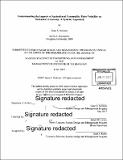Understanding the impacts of agricultural commodity price volatility on Nebraska's economy : a systems approach
Author(s)
Scrivner, Gene S
DownloadFull printable version (20.98Mb)
Other Contributors
System Design and Management Program.
Advisor
James M. Lyneis.
Terms of use
Metadata
Show full item recordAbstract
Agricultural production is one of the cornerstones of Nebraska's economy and acts as a driver for the state's economy. Nebraska's geography, infrastructure, and industry all support agriculture, and many industries within the state depend on the labor and goods from agricultural producers. In recent years, prices for agricultural commodities have become increasingly volatile, with fluctuations rising and falling much more intensely than in previous years. Global supply and demand for agricultural commodities continues to increase, especially major commodities produced in Nebraska such as corn, soy, and cattle, and it is likely that price volatility will continue to occur. The impacts of this price volatility are being felt across the state, especially as agricultural commodity prices trend downward. Nebraska's agricultural producers are increasingly unable to break even on their operations, and Nebraska lawmakers are facing a budget shortfall caused in large part by the reduced income received from agricultural production and its ancillary effects. The problem facing Nebraska is incredibly complex, as negative downstream effects are being caused by low commodity prices received by agricultural producers. Policy mechanisms are available to Nebraska lawmakers to manage this problem, but have the ability to exacerbate things if the careful planning and implementation of these policy mechanisms is not conducted. This thesis aims to help define some of the dynamic impacts being felt in the state of Nebraska from global volatility of agricultural commodity prices, and think about these impacts long term. This thesis approaches these issues from a systems thinking perspective, attempting to capture a holistic viewpoint of the major impacts felt in the state now and the potential impacts in the future. An exploratory system dynamics model has been created to explore these dynamic issues and the impacts that different policy mechanisms might have on the state. This thesis by no means provides the "answer" for how to insulate the state of Nebraska from these negative impacts, but offers a first step towards long term systems thinking on the issue.
Description
Thesis: S.M. in Engineering and Management, Massachusetts Institute of Technology, System Design and Management Program, 2017. Cataloged from PDF version of thesis. Includes bibliographical references (pages 126-132).
Date issued
2017Department
Massachusetts Institute of Technology. Engineering and Management Program; System Design and Management Program.; Massachusetts Institute of Technology. Integrated Design and Management ProgramPublisher
Massachusetts Institute of Technology
Keywords
Engineering and Management Program., Integrated Design and Management Program., System Design and Management Program.